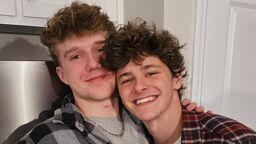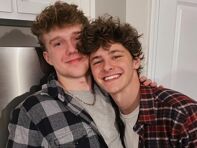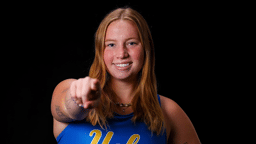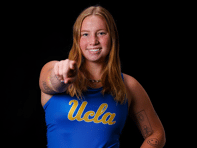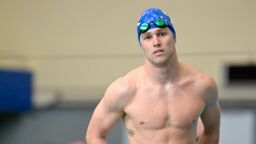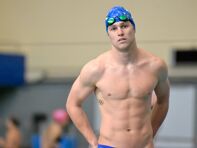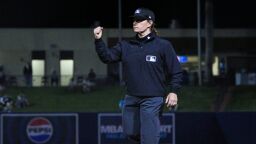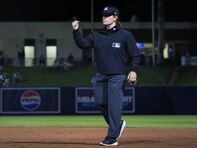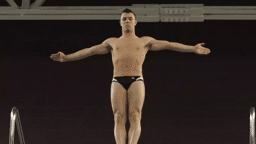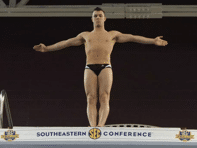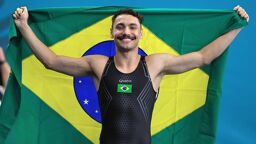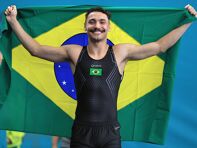I had made the same weekend walk from Penn Station through Hell’s Kitchen, one of the gayest areas in New York City, to our CBS studio from September through March for 11 years. But this particular January Sunday in 2015 was different. As I walked into our talent production meeting for that week’s NFL studio show, my heart was beating out of my chest.
Sitting around the table were our producers, writers, researchers, as well as our on-air talent. I knew everyone around the table for at least two years, and some for as long as 11 years, since I started working as a freelance production support staffer for CBS Sports as a senior in high school. Still, the moment was nerve-wracking.
My plan had been in the works for a few weeks prior to this day and I wanted to get some advice from some trusted people within CBS Sports. I first spoke with Jen Sabatelle, CBS Sports’ Senior Vice President of Communications, Drew Kaliski, Senior Producer of our NFL studio show, and our Production Manager, Andrew Pezzica, who was my direct supervisor. Upon talking with them, I was immediately put at ease as each didn’t bat an eye when I came out, were as supportive as anyone could hope, and helped me to plot my course of action going forward.
During our production meeting that morning, as Drew was wrapping up the meeting, he told everyone that I had an announcement to make. I was about to come out to my CBS Sports family.
At that moment, I stood up and came out to everyone as bisexual. I told them that I was still the same guy and hoped nothing would change, and then started to nervously ramble.
Sensing my nervousness at what I had just disclosed, Boomer Esiason stood up, gave me a hug and told me that I was loved and that nothing would change. After that came a round of applause from the rest of the cast and crew, hugs and a ton of positivity both that day and the weeks ahead as word spread throughout my CBS Sports family.
Fourteen hours later, as I walked back to Penn Station to go home, I felt more liberated than any other walk from work in 11 years.
I was fortunate enough to begin my journey with CBS Sports as a senior in high school. While my classmates were working at supermarkets and caddying rounds of golf, I was over-the-moon lucky enough to work weekends at a job that was beyond a dream come true as someone who grew up as a major sports fan.
I started, and still do, the jobs in our studio during our NFL, college football and college basketball shows that make the people on-air and behind-the-scenes comfortable so they can do their job as efficiently as possible. I make sure catering is set up correctly, copy and distribute the show rundowns to our production staff, make sure car services home are set up correctly, as well as many other important duties.

After my first few seasons at CBS while I was in college, I still loved what I was doing on the weekends. CBS Sports’ Operations, Production and Management teams did, and continue to do, a fantastic job at empowering those who stay on with opportunities to advance. I eventually became the Senior Production Support member of our studio shows at CBS Sports, responsible for liaising with our on-air talent, management team, and taking on some of the more elevated tasks and requests that pop up during the course of days of long hours of live television.
People ask if my job has been a dream come true for someone who grew up eating, sleeping and breathing sports. I tell them that it actually isn’t, because I have been fortunate enough to have opportunities that I could never have even dreamed up.
I have worked on-site at five Super Bowls and 10 NCAA Final Fours. I’ve worked for and built relationships and friendships with athletes and sports broadcasters who I grew up watching. Beginning this journey, I couldn’t imagine the bonds, in and out of work, that I have built through a part-time, seasonal job. The experiences have been jaw-dropping, but it always comes back to the people.
Back to those walks to and from work. Those walks the first 11 years and the last five have been very different.
As I walked through those neighborhoods before 2015, an internalized homophobia often emerged. I had come to grips with the fact that I was bisexual, and I had no real issue with who I was. I grew up in a very accepting family that normalized it, and there were LGBT people present in my life through my childhood and teenage years.
The internalized homophobia came because of stereotypes. As I walked past people in that Hell’s Kitchen neighborhood to and from work, I would pass those who embodied that stereotype — tight clothing, certain communication traits, everything that sets off “gaydar.”
I didn’t have an issue with being bisexual. Like others, my real issue was that I felt alone.
I felt like I was the only gay or bisexual male into sports and not into fashion (I hardly ever wore jeans in college) or theater. I was comfortable having same-sex attraction, but I didn’t feel part of the LGBT community. I felt different from everyone else I was seeing or knew in the community. At the same time, I felt like I was the only person at work who was hiding this aspect of myself.
Luckily, at some point while I was in college, I discovered Outsports. At that time, I hadn’t seen anything like it, and it gave me a glimmer of hope as I read pieces from people in sports who were coming out.
For so long, I thought that my sexuality and my work at CBS would always have to be separate.
For so long, I thought that my sexuality and my work at CBS would always have to be separate. I never had a traditional coming out, but I did start telling different friends in college and other parts of my life.
The reasons why I wasn’t going to come out to my co-workers and friends at CBS Sports evolved. At first, it was simply fear that I wouldn’t be able to keep a dream job if my co-workers knew about my sexuality.
While my colleagues never gave me any reason to think it would play out that way, I was too afraid to take the risk. For those that haven’t experienced life in the closet, the best way I can convey it is that we often envision the worst-case scenario playing out, triggering numbing paranoia.

Eventually, my mindset evolved into thinking that I didn’t want to be known as the “gay guy” on the team. In hindsight, this was some progress, but I wanted to be known for what I brought to the table as a teammate and member of the crew. It was preferable for me to be known for being obnoxiously loud and positive during our 7 a.m. arrival at the studio on NFL Sundays and college basketball studio days rather than for my sexuality.
As the world changed, my thinking started to come around as well. Michael Sam came out of the closet in 2014 prior to the NFL Draft, and virtually every member of the sports media was asked to weigh in on the subject.
I started seeing and hearing accepting and supportive statements about LGBT athletes from on-air people I worked with as well as hearing positive statements of support when the topic came up in discussions among co-workers. Hearing those supportive comments played a big role in my start to envision a path out of the closet.
I tell those I’ve worked for with a public platform that this is why it’s so important for them to vocalize support for marginalized communities when it’s relevant in the sports news cycle. Athletes and other public personalities may not realize it, but closeted people are listening, and sometimes it might even be someone in their life who is positively affected by their accepting opinions. In this case, I was one of those closeted people who was listening and uplifted by their statements.
The real final push for me came when I met members of the Outsports community and got to see them living their truth. Months before I came out, I was connected with Anthony Nicodemo, a gay high school basketball coach who coached close to where I grew up in Westchester, N.Y. I got to spend some time with him and witnessed the respect he maintained among the athletes he coached and others in the basketball world where we lived. He was able to fully be himself in front of others.
Meeting others like Derek Schell, Conner Mertens, Mason Briles, Ben Larison and Matt Kaplon, who were able to live their authentic truth, continued to reinforce this as well. It is hard to imagine how unthinkable that was not so long ago. And the list kept growing.
I’ve made tremendous friendships through Outsports, each with a unique story and journey. Reading coming out stories from other LGBT people in sports media provided a huge boost as well. The courage of LZ Granderson, Izzy Gutierrez, Steve Buckley, Jared Max, Christina Kahrl and others coming out signaled to me, and so many others, that we didn’t have to hide who we are to keep our career and those bonds built in the industry.
After I came out on that January Sunday in 2015, my hope was that nothing was going to change. But things did change — for the better.
My relationships and friendships with co-workers have only grown tighter. And it hasn’t just only been those who are seen on our shows each week who have accepted me for who I am, but from the technical and production crew, as well as management.
Coming out had a positive effect not just personally but also professionally.
Coming out had a positive effect not just personally but also professionally. I became more confident in myself and my decision making, an important personality trait to carry while working in live television. I’ve described my sexuality being a secret like carrying a heavy backpack. I was carrying this backpack around for so long that once I finally removed it I realized it had been weighing me down.
In hindsight, as long as I remained in the closet, I could never have made the next step toward reaching my potential as a professional or in my personal relationships at my job.
It’s considered a cliche for someone to say the company they work for is “like a family,” but I can genuinely say that it is at CBS. Our team, from upper management through other part time/freelance staff to full-time production crew to our security guards and facilities staff, have been completely accepting. There have been zero negative encounters or perceptible changes in any of my professional or personal relationships.
I wear my Outsports bracelet — which I got from the last two Outsports Prides I attended in New York and L.A. — proudly and often into work. I’ve also connected to other people in sports media, both in and out of the closet.

While I spent years worrying and imagining the worst possible result of coming out in the sports industry, I realized what I ultimately did was underestimate my co-workers. I continue to be judged on my results, my effort and how good a teammate I am — and that is exactly the way it should be. The concern over whether I would be known as the “gay/bi guy” in the workplace was shed because I realized, even if people know me as that, it’s not a negative.
If I could go back 16 years to when I started, I would tell my younger self that this industry is no less accepting than virtually any other out there. While being there 11 years certainly played a role in feeling comfortable coming out, I can confidently say that if I had chosen to come out in my first or second year at CBS Sports, I would have been just fine. Just like I’ve read and heard from so many others through Outsports, the only regret I have about coming out is that I didn’t do it earlier.
Today, after my professional coming out five years ago, instead of walking home from work through Hell’s Kitchen bitterly judging fellow members of the community, I now walk into the gay bars, sometimes with ally co-workers. These walks are so much more comfortable and even more gratifying than I could’ve ever imagined.
Theo Rabinowitz, 33, is a freelance member of the sports television production industry, mostly working as Senior Production Support member at CBS Sports for their NFL, college basketball and college football studio shows since 2004. He can be reached via LinkedIn, Facebook, Instagram or e-mail at [email protected]
Story editor: Jim Buzinski
If you are an out LGBTQ person in sports and want to tell your story, email Jim ([email protected])
Check out our archive of coming out stories.
If you’re an LGBTQ person in sports looking to connect with others in the community, head over to GO! Space to meet and interact with other LGBTQ athletes, or to Equality Coaching Alliance to find other coaches, administrators and other non-athletes in sports.





